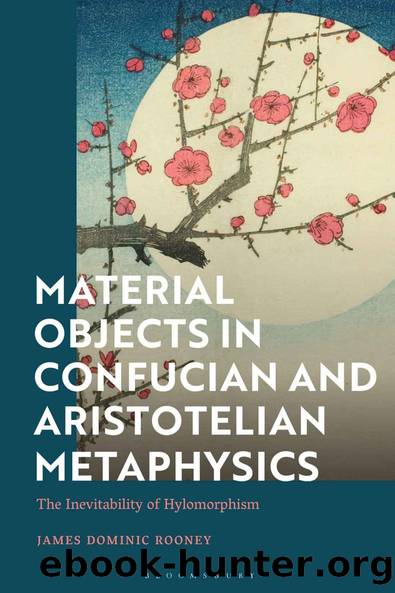Material Objects in Confucian and Aristotelian Metaphysics by James Dominic Rooney

Author:James Dominic Rooney [Rooney, James Dominic]
Language: eng
Format: epub
Publisher: Bloomsbury Publishing
Published: 2022-03-23T16:00:00+00:00
Radical Monism
The differences between constituent and relational ontology highlight a way in which we can decide among the aforementioned interpretations of Zhu Xiâs metaphysics: we can determine whether there is any sense in which it is essential to li that it belongs to any particular material object. And this task is easier to do than it might sound, because Zhu Xi is committed to the claim that li is âoneâ in all its instancesââli is one, the instances manyâ (li yi fen shu çä¸åæ®)31âwhich is a dictum he inherits from his philosophical predecessors, the Cheng (ç¨) brothers. Recall I have already shown that Zhu Xi affirms it is necessary for the existence (and nature) of a material thing that it be characterized by li, and that both of the interpretations agree that, necessarily, if something is characterized by both li-qi, then that thing constitutes a material thing. In order to show that Zhu Xi is a relational ontologist, and not a hylomorphist, one would therefore only need to show that li characterizes no qi necessarily.
One might think that, since li constitutes the natures of things, and there is only one li, then Zhu Xi must hold that there is necessarily only one material thing. Russell Hatton has argued for just this conclusion, contrasting Zhu Xiâs li over and against substantial forms:
the substantial form is to some extent responsible for similarities among different kinds of things, as is li. But the specific difference of manâs substantial form is unique to men, i.e., rationality. And it is this which ultimately makes a man the kind of thing he is and different from all other kinds of things. Li, however, contains nothing that is unique to any species. Li ⦠is essentially the same in everything. The li of a man contains nothing that is not found in the li of a horse, a tree, or a pen ⦠. If [Zhu Xi] can be said to recognize the existence of âkindsâ (i.e., species) in the Aristotelian sense, then they must be said to be due to [qi].32
Hatton then concludes that Zhu Xi must also deny the possibility of substantial change:
It can in fact, be argued that for [Zhu Xi] all differences are differences in degree among things which are composed of li, which is essentially the same in all, and [qi], which is continuously variable in various aspects. Thus it might be said, that the only differences [Zhu Xi] recognizes are accidental differences and that there is no place for substantial differences in the Aristotelian sense within his system. Therefore, there is no place for substantial form. Thus, li cannot be substantial form.33
That is, if Zhu Xi holds that every change is merely an accidental modification of the one material particular that exists, then Zhu Xi is a radical monist, because the world composes (apparently essentially) one material thing. And many of the objections to a hylomorphic reading of Zhu Xi are implicitly or explicitly accompanied by claims that he believes that there exists only one material object.
Download
This site does not store any files on its server. We only index and link to content provided by other sites. Please contact the content providers to delete copyright contents if any and email us, we'll remove relevant links or contents immediately.
| Confucianism | Feng Shui |
| I Ching | Jainism |
| Karma | Shintoism |
| Sikhism | Tao Te Ching |
| Taoism | Tibetan Book of the Dead |
| Zoroastrianism |
The Tao of Physics by Fritjof Capra(1861)
The Diamond Cutter by Geshe Michael Roach(1675)
Feng Shui by Stephen Skinner(1622)
Human Design by Chetan Parkyn(1581)
The Alchemy of Sexual Energy by Mantak Chia(1496)
Tao Te Ching by Lao Tzu(1488)
365 Tao: Daily Meditations by Ming-Dao Deng(1307)
Tao Tantric Arts for Women by Minke de Vos(1267)
Sun Tzu's The Art of War by Giles Lionel Minford John Tzu Sun(1249)
Karma-Yoga and Bhakti-Yoga by Swami Vivekananda(1234)
Sidney Sheldon (1982) Master Of The Game by Sidney Sheldon(1193)
Buddhism 101 by Arnie Kozak(1188)
The Analects of Confucius by Burton Watson(1149)
The Art of War Other Classics of Eastern Philosophy by Sun Tzu Lao-Tzu Confucius Mencius(1146)
The New Bohemians Handbook by Justina Blakeney(1106)
Tao te ching by Lao Tzu(1081)
The Way of Chuang Tzu by Thomas Merton(1074)
The Sayings Of by Confucius(1032)
Bless This House by Donna Henes(993)
